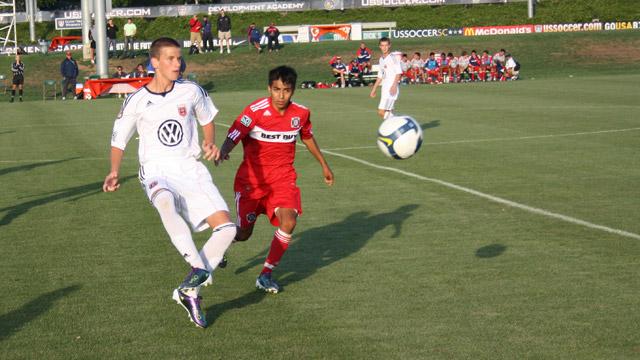Are MLS academies killing college soccer?

Do you have a question you want answered? Email us, find us on Facebook, or comment below. We want to hear from you!
This week, we ask our Managing Editor, Robert Ziegler, "Are MLS Academies killing college soccer?"
Certainly a pertinent question given all the discussion currently going on, but the short answer is "No."
When we talk about getting from A to B as a soccer nation, we are really describing a process by which soccer becomes a major professional sport and, especially, the men's national team is contending for World Cup titles the way the women already do. People want to see this, but I'm pretty sure most American families don't want this more than they want their children to have the kind of economic and professional opportunities most of us grew up with.
Around the world, it's typical for young men to stop with their schooling at 16 or 17 years of age in order to pursue their dream of a pro soccer career full time. In many cases, those players are already immersed at a specific club, training many times a year. At ages 17-22 or so, these players either find their dreams unrealized or coming to fruition as part of a professional club's first-team squad.
Here of course those are the ages when many young men and women are attending university, and so the conflict now becomes whether top talent in the U.S. should move into the pro ranks right out of high school, or continue on with the traditional college (and college soccer) route.
Most college coaches I know are fairly positive about the academy system. They recognize that players are being trained and developed better, and when I go to Academy showcase events like the playoffs last month in Dallas, there are plenty of college coaches around. What's starting to happen now is that MLS teams are using their academies as a means of identifying future first-team talent, somewhat like what goes on around the world (although our entire context is still quite different than those places).
MLS has a "home-grown" player rule that nobody seems to quite understand. Apparently in some cases a kid rode his bike near the MLS team's training ground and they suddenly were able to claim rights to him. While the idea of "home-grown" is to encourage MLS teams to invest in youth development for the potential revenue produced by selling players on the international transfer market, it's hard to think that this won't someday come under a pretty stiff legal challenge from some family that doesn't want to play for Team X (the rule allows teams to retain rights to such player even after they have attended university, by the way).
One thing people sometimes don't understand about the overseas system is just how high the rate of failure is. For all the teams full of young teen players at these clubs, very few of them end up making to first-team professional status. Those players are not left with some sort of safety net when it comes to a professional future, although some countries are better than others in insisting that young students learn some kind of trade.
It's hard to think that a large number of families in the U.S. are going to take that risk when the offer of a college scholarship (or even just attending college at their own expense) is so readily available here in America. Now I'm on record in reminding families that they don't have to give up college if they give up college soccer, still, most are going to continue to choose to stay in America and go to school rather than put all their eggs in one professional soccer basket.
There is a fraction of a percetage of players at the top who should seriously think sooner rather than later about going the professional route either here or overseas, because their prospects are so much more promising, but most of these should have a pretty good idea by the time they are 16 that they have some extra giftedness in that area. For college soccer to lose that small amount of players won't hurt it any more than losing a few players ever year to early entry into the pros. I think the people who support college soccer (which is still largely a non-revenue sport in the context of major athletic departments), will still be there enjoying the special atmosphere it provides, with or without player X.
In the meantime, youth players are getting better training and young men who just aren't interested in the college opportunity get a much better chance to pursue their professional dream. Some individual decisions may get a bit dicey, but overall I think there are enough players to go around for everybody.
Read our previous "Letter to the Editor", "Why doesn't the U.S. produce star players?"
Trending Videos
Headlines
- SIMA Recruiting Roundup: April 29-May 5
- How Do I Get Scouted by TopDrawerSoccer?
-
Mid-Atlantic High School Roundup - May

- TopDrawerSoccer TeamRank Update - Girls
-
Rocky Mountains HS Roundup - May

- GA Pacific Northwest Talent ID Event
-
Pacific NW High School Roundup - May

-
2027 Girls Club Soccer Player Spotlight

-
Southeast High School Roundup - May

- SIMA Summer Showcase Set for July
